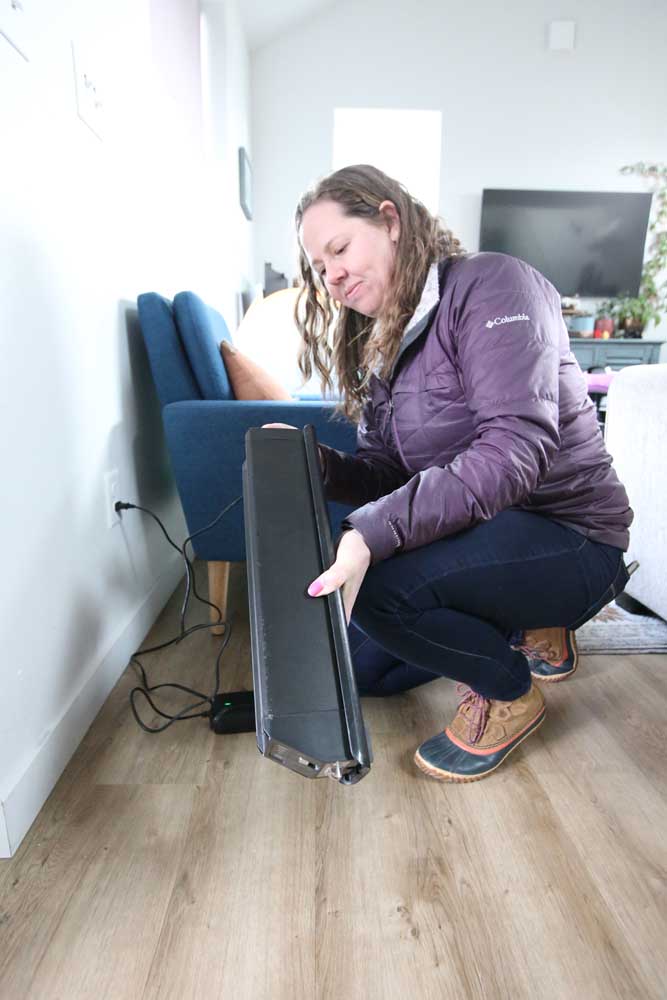Pacific Power grants help Central Oregon plug into electric vehicles
Published 9:30 am Sunday, February 12, 2023

- Michelle Dery plugs the battery from her electric bike into the outlet for charging, inside her home in Bend on Tuesday afternoon.
It was nearly six months ago that Michelle Dery and her husband became a one-car family.
Not noteworthy, for sure, but they’re also a one-electric bike family.
Dery and her husband felt that they could make a difference in the effort to protect Bend’s unique environment by pouring less greenhouse gasses into the atmosphere through the use of electric power — their rooftop solar panels that power their e-bike.
They like the idea so much, they plan to leave their car in the garage once they get a second bike in April.
Kôr Community Land Trust, which builds net-zero affordable homes, gives an electric bike to each purchasing household as part of the Pacific Power Mobility Grants. The program encourages use of electric power and the land trust is one of 18 recipients statewide. Six of the recipients are in Central Oregon. They will use more than $630,000 from the program for electric transportation projects that range from supporting electric bicycle purchases with rebates to supporting the installation of charging stations.
It’s the third year for Pacific Power to issue grants. The funds for the mobility grants come from the state Clean Fuels Program credits, which are traded by fuel producing companies to meet the state’s mandate of a 10% reduction in the average carbon intensity through 2025.
“We had been looking (for homes) in Prineville and commuting to Bend,” Dery said. “When fuel prices got high last year, we decided to get rid of one of our cars and bought an electric bike.
“It’s not easier to use. It takes more logistics, and it’s not good in the winter. It feels nice to be more environmentally conscious as well.”
At 350 Deschutes, a nonprofit that educates, organizes and works toward creating climate stability, is another Pacific Power grant recipient. The nonprofit plans to use its funds to create equal access to electric vehicle equipment and technology. The plan calls for reaching out to rural and underserved communities to see what they want to do to lower their carbon footprint.
That could be in surveys or focus groups, but the goal is to find out what a community needs to increase accessibility and affordability, said Diane Hodiak, 350 Deschutes executive director.
“Electric vehicles have a reputation for only being for the wealthy,” Hodiak said. “I don’t think that’s necessarily true. The question is how to do we help under-served communities access electric vehicle charging?
“That’s the piece that’s been more difficult.”
As an electric utility, Pacific Power has a mission to drive down greenhouse gas emissions, said Kate Hawley, Pacific Power electric vehicle senior project manager. It’s part of an effort to meet the state mandate of 100% electric vehicles by 2035.
“We’re trying to drive down the cost and create an equitable experience by providing this grant money back to these communities,” Hawley said.
The Central Oregon nonprofits and agencies selected for the Pacific Power grants were culled from a competitive field of 38 applications, said Berit Kling, Pacific Power senior product manager in the clear fuel program.
“The projects benefit the community and enable mobility in Central Oregon,” Kling said. “We’re looking for equity and being located in a rural or economic disadvantaged community where (electric) transportation is not common. We’re looking for innovation.”
One such program is the city of Bend’s E-bike rebate program, which supports workers by providing clean-fuel transportation. The city of Bend was awarded $150,000 to fund 75 $2,000 electric bike rebates that will be issued via a lottery. Applications open March 20, said Cassie Lacy, Bend senior management analyst.
“The Bend City Council created this program specifically for the purpose of encouraging biking as a form of mobility in Bend,” Lacy said. “In addition to the greenhouse gas reduction benefits, using a bike to get around rather than a car has additional benefits in reducing traffic congestion and making roads safer for all.”
When the Bend Park & Recreation District was awarded $17,249 in 2021, it used the funds to buy an electric lawn mower for its 200-plus acres. This spring will be the first time the district gets to try it out, said Sasha Sulia, park operations superintendent.
The benefits will be less noise, fewer greenhouse emissions and less maintenance, Sulia said.
The Dery home came with solar panels, so the cost of charging an electric bike and powering the home comes to about $11 a month, Michelle Dery said. The Derys plan to use their electric bike more often in the spring. The goal is to leave their car at home.
Dery wears a bright green jacket, the bike is bright orange and there’s a flag attached to a trailer that she attaches to tow her son.
Using an app, Dery maps a route that takes her safely along the five miles from her home to her son’s preschool. It takes about 20 minutes, biking about 21 mph, she said.
”It’s been fantastic for us,” Dery said. “We had to get used to charging it at night. We bought snow goggles for the cold and next year we plan to buy chains for the tires to use it in the winter. It feels a lot safer than peddle bike when you have to merge into traffic.
“We really love for our son to grow up appreciating the natural beauty of Bend and that includes not driving everywhere.”
Central Oregon nonprofits or agencies received $630,000 from Pacific Power to support the use of electric vehicles. They are:
- 350 Deschutes, to support education or outreach campaigns, a needs assessment and research and development for Central Oregon: $85,660.
- Central Oregon Community College, to support education or outreach, charging infrastructure, and EV procurement: $111,991.
- City of Bend to support e-bike rebates: $150,000.
- City of Prineville to support charging infrastructure: $200,000.
- KOR Community Land Trust for education or outreach and electric bike equipment: $32,243
- Upper Deschutes Watershed Council for education or outreach and electric vehicle purchase: $60,000.
Source: Pacific Power






